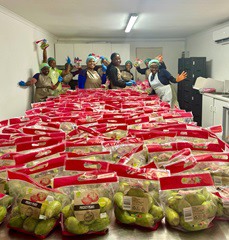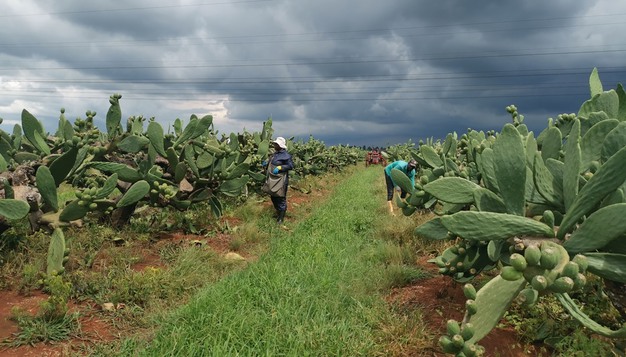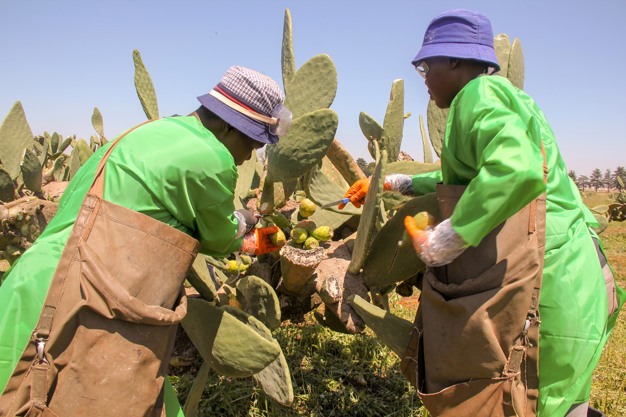 When first Freda Linde took some of their Skinners Court cactus pears to a municipal market in Gauteng, the agent was reluctant: he'd see what he could do with this fruit that most South Africans don't know.
When first Freda Linde took some of their Skinners Court cactus pears to a municipal market in Gauteng, the agent was reluctant: he'd see what he could do with this fruit that most South Africans don't know.
Right: celebrating the first day of packing for Freshmark Checkers
This season, two decades on, Ednil is supplying into the Freshmark programme for the first time and daily supplying the markets in Johannesburg and Tshwane.
Moreover, from their farm outside Bapsfontein, Gauteng, they are adding value to their fruit by peeling premium fruit for certain Spar and PicknPay branches in the main cities and on the East Rand where it is in high demand among the lovers of cactus pears – called prickly pears in South Africa – who appreciate the convenience of peeled fruit.
6,000 cactus pears are peeled every morning for same day delivery across Gauteng
The Lindes had encountered the Skinners Court variety (it looks a lot like the traditional Morado, which is mainly planted for cattle fodder) on a visit to Freda's aunt in Wakkerstroom, Mpumalanga and after tasting the fruit, Martin and Freda decided to build a business on Skinners Court, which remains the only variety they have been growing for the past 35 years.
Skinners Court doesn't bear as heavily as the Morado, but its taste is superior. The introduction of pollinating bees has definitely improved the yield, Freda notes.
"Just recently we received another compliment from a Checkers customer who'd bought our fruit," says Martin Linde. "It's definitely a nicer fruit than the Morado, sweeter and juicier. We're willing to ask a higher price for our fruit and in general people are willing to pay that price."
It has been a family affair: their youngest son Marcell developed the market for peeled fruit and juice, the latter now managed by their other son Ruann.
An average of two tonnes go through Ednil's packhouse every day during the season between mid-January to the end of March. The morning starts early: 6,000 cactus pears harvested the day before are peeled by noon for dispatch across the province during the afternoon. (Horses at the neighbouring East Rand Polo Club come galloping up to the trailer bringing them thousands of peels daily.)
For an average ten weeks of the year the same group of women have been coming from Hammanskraal for almost twenty years to harvest, peel and pack Ednil cactus fruit.
Cactus fruit trees are pruned through the year to a manageable size bearing fruit on the outside, so that none of the fruit with their pesky thorns need to be picked from the inside of the trees.
Class 2 fruit are juiced for an astonishingly sweet drink – their daughter Lizanne remarks that she prefers it with a touch of lemon and ginger – that is popular at Pretoria's Hazel Food Market on Saturdays. They'd like to, in time, expand on the juicing side of the business.
Multiple stages of dethorning
After harvesting with the appropriate protective clothing, the intensive task of dethorning the fruit starts.

"One can never guarantee a total absence of thorns," Freda points out, but at Ednil they pride themselves on fruit that will never disappoint. They use a waterbased method of dethorning; Martin is cautious of the effect of thorns getting into the respiratory systems of staff.
"Our cleaning method is really intensive," Lizanne adds. "After an initial rinse, it goes through eight to ten roller brushes to remove the large thorns. Then it's wiped by hand and dried off, also by hand. Every fruit is wiped two to three times to remove what we call the dust thorns, the really tiny ones."
The filters on the roller brushes are replaced as many as five times a day to rid it of the masses of removed thorns. These are bagged and burned.
Hands-off cactus pear farming doesn't exist
Freda observes that cactus pear farming is much more intensive than some might think.

Spraying for cochineal outside the harvest season, then manually washing off the cladodes with soapy water during harvest (the insecticide has a withholding period of 28 days) constitutes much of cactus pear orchard hygiene.
Even more time-consuming is warding off Cactoblastis moth larvae nestled within the leaves. Introduced almost a hundred years ago by the government to counter the invasive Opuntia forests that had sprung up in the Eastern Cape, they have long had the moth around.
"But last year, for the first time, the Cactoblastis became a plague in our orchards. It was the first time the caterpillars were inside the fruit. We had to work extremely hard to bring down the numbers with caterpillars inside almost every cladode. I'd like to believe we've gained the upper hand."
The egg packets of Cactoblastis cactorum, a moth native to South America, closely resemble thorn bases. They were scraped off and burned, while masses of infested cladodes were shredded to pulverize the next generation developing inside.
"Cactoblastis is seasonal - Sept/October and Feb/March. Close observation is needed to spot the egg packets, especially during the harvest," she says.
Superfruit status beckons
Lizanne remarks that in the UK and Europe cactus fruit's nutritional qualities are gaining attention. She expects it will soon be considered a superfruit. Martin observes that its beneficial use in the management of diabetes has been corroborated through studies – surprising, given its sweetness.
"Something that's really close to our hearts," continues Lizanne, "is the matter of female empowerment. The women who work here come back year after year. For harvesting my mother only appoints women. We encourage them to stand on their own feet and I think that's something really beautiful that my mother has done here."
For more information:
Freda Linde
Ednil
Tel: +27 82 491 0192
Email: askednil@gmail.com
https://www.facebook.com/EdnilPricklyPears/
